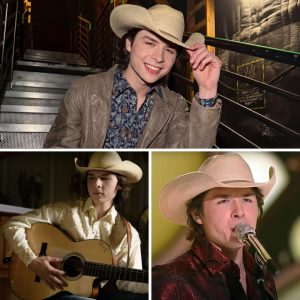

A snippet of country superstar Zach Bryan, unreleased song entitled “Bad News” created a storm both online and in the White House. Its lyrics include a pronounced call-out of the current country-wide raids by the Immigration and Customs Enforcement that serves as part of President Trump’s mass deportation program.
“Bad News” serves the relation formed between country music and its current connotation.
Over the past two decades, the genre has become associated with the national treasure of drinking with friends in a pickup truck or at the local bar.
However Bryan and other popular artists are proving that country music can return to its roots of writing from the soul.
During the 1950s all the way to the early 2000s, country music was not afraid to get its hands dirty with emotion, taking their audience on a trip into the lives of character, all with the simple background of a few instruments.
Although this strain of country music may seem far-gone, some artists are going against the grain to rejuvenate the genre with the same sentiments.
Tyler Childers has become a pioneer in bringing that authenticity back. Many of his songs are known for exploring Appalachian culture, not shying away from themes such as depression or addiction. Childers’s influences of bluegrass, folk and blues have additionally given him an edge.

Childers’s album, “Live on Red Barn Radio I & II” particularly stands out with its lack of post-production work and lyrics that draw heavily from his own life experiences.
Additionally, Childers has not shied away from portraying topics that may be controversial. In his music video for “In Your Love,” he shares a love story between two male coal miners in rural Kentucky, sharing a glimpse of an often underrepresented group in the genre.
Similarly, artist Chris Stapleton’s songs consistently return to the charts and his concert tickets can pull over a thousand dollars for front row seats. His cover of “Tennessee Whiskey” and original song “Think I’m in Love with You” invoke the feeling of watching a way-too-talented musician sing karaoke at your local dive bar.
Despite his success, Stapleton’s motivation remains true to writing music for the people he loves. “I’d be lying if I said that I don’t like going out and playing a show to a full house of people. Especially when you’ve played for no people.” Stapleton said in an interview with GQ. “But to be famous for the sake of being famous…. That was never the main want.”
Perhaps the most influential of them all, and drawing from the beginning: Zach Bryan. His hit album, “The Great American Bar Scene” included ballads, poems, and the inclusion of only one or two instruments. Bryan’s music risks pay off. It is not meant to be easy listening while cooking on a grill. The work is meant to transport the listener into a different state of being, guiding them with vivid imagery to imagine their life the way Bryan intends.
Bryan swapped Riley Green’s, “We stand for the flag, and if you don’t like it we don’t care,” with an echoing guitar solo of the “Star-Spangled Banner” in the beginning of “Overtime.” Those subtle details transform the message from “America can do no wrong” to the deeper meaning of what it means to be an American.
The link between extreme patriotism and country music takes away the uniqueness of country music being about the separation of classes, not ideologies. Many country artists, such as Jason Aldean and Chris Janson, have openly performed at the Republican National Convention, further making artists like Bryan and Childers all the more shocking for disregarding their counterparts’ beliefs and rejuvenating the notion that country is emotional, not political.
Ultimately, at such a divisive and stressful time, Americans want country music that relates to their experiences instead of masking it.





